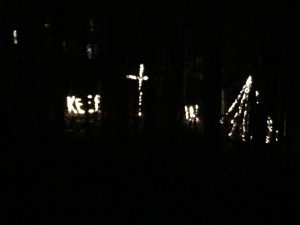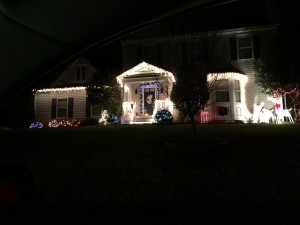I should start by saying we don’t know many of our neighbors. There’s the one I refer to as The Encroacher for his wild disregard for property lines, and there are the seemingly nice ones across the street who I’ve spoken two twice since they moved in, once when I delivered a welcome cake and the second time when we were all out shoveling snow last winter. There are a few I know by sight from the pool and there’s my accountant-neighbor who I actually look forward to seeing each tax season. Overall, not a great track record for someone who’s supposed to be familiar with loving neighbors.

It’s bigger and brighter than it seems from this picture I took with my phone.
I do not know the neighbors with the new Christmas lights, the ones who made a large Christmas tree out of lights and stationed it so it shines through their back woods and directly at the main road into the neighborhood. You can’t miss it. When it showed up last week I enjoyed the novelty of the giant lit tree in the midst of the real bare winter trunks, and it was a nice surprise, to be greeted through the woods like that.
After a couple nights away, I drove back into the neighborhood in the dark last night and it was suddenly apparent which neighbors had been busy putting up their lights and decorations while we were gone. I love exterior Christmas lights, so I drove slowly and took in the new splendor of the neighborhood – and I saw that the Christmas tree neighbors had added to their message. They’ve staked out more ground in the woods and you can see from the picture that they want me to keep Christ in Christmas. (I suppose it’s possible they want me to keep a cross in a tree, but I’m going with the simplest explanation being the most likely.)
The woods were brighter. There were more lights to catch my eye on the drive through the neighborhood. I don’t exactly disagree with their message. So why did I struggle to like their full message as much as I’d liked the tree on its own?
I think my trouble with it has to do with audience. If I went to worship and the sermon was about “keeping Christ in Christmas” I’d listen attentively and hopefully for what that might mean in the context of our gathered Christian community. If I met a friend for coffee and he mentioned some specific ways he was attempting to “keep Christ in Christmas,” I’d want to know where he was coming from and what I might glean for myself from his experiences of the season and his personal devotion. In my neighborhood, where most of us don’t know one another well and where we can safely assume we aren’t all Christian, is a prominent drive-by “keep Christ in Christmas” message the best, most faithful way for a Christian to greet her neighbors?

I’m thankful for this neighbor’s candy canes and reindeer.
What if Christ was never in Christmas for some of our neighbors, who might be Jewish or Muslim or Hindu – but who might still decorate their homes in lights at this dark time of year and who might even participate in some of our cultural Christmas traditions? What about the cultural Christians or former/lapsed Christians who also know this as a special time of year, who put up lights and experience holy longing, though they may be estranged from God or religious community right now? As Christians, is our best seasonal greeting an indiscriminate reminder to observe a religious tradition that not everyone is part of? Obviously, I don’t think so. I would have preferred just the lit tree. I would have even been fine with a message like “Christ’s light shines in the darkness” – biblical and a statement of faith for the person making it rather than a correction for everyone else.
Jesus is the reason for the season, but Christians don’t have a lock on celebrating all he ushers into this broken world. If my Muslim neighbor can demonstrate this with a hug or my non-religious neighbor with festive seasonal lights that don’t have much to do with John’s warnings or Mary’s song, I’m OK with that. In church, we can remind ourselves all we want to why we do all this each December. In the world, I wish we’d preach less and open ourselves more to seeing the lights in our neighbors’ yards. We have never been able to contain Christ, thank God, and we might be surprised by how Christ does indeed shine, even without his name in lights.
